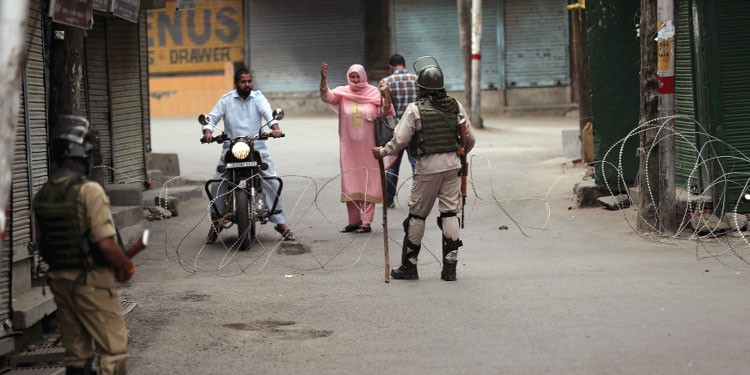
Following the Kashmir lockdown, a look at how journalists pursue truth and the kind of support they need when freedoms are in jeopardy

One of the purposes of censorship and the complete media blackout in the post-August 5 situation in Jammu and Kashmir was to keep the world in the dark about the violations of human rights. Journalists working for local newspapers or Srinagar-based correspondents for media outlets went through hell. They could neither send their dispatches nor freely develop stories. The local media were not allowed to come out with special editions.
The curfew that has gone on for more than a month now, has made not only people’s lives extremely difficult but also severely impacted journalistic access. The access to information is limited to Kashmir Media Service (KMS) and international wire services. One can also try using personal contacts in Kashmir, but given the ban on telecommunication and internet services, chances of establishing contact are slim. As such, only 25 to 30 per cent of news is coming through compared to the level ahead of the indefinite siege.
However, leading international media outlets like The New York Times, Bloomberg, BBC, CNN, AFP, and Reuters have reported some of the atrocities committed by the Indian forces. Some of their correspondents have provided eyewitness accounts. Some have even managed to interview families of people who have gone missing or been forcibly taken away by the Indian security forces.
Journalists reporting from Srinagar are playing a significant role in chronicling life in Kashmir during the siege.
Hopefully, once the restrictions are lifted, more stories will come out. It is impossible to stop the media for long. Independent journalists have always reported from conflict accepting the risks that go with it. The BBC, in one of its documentaries during the Iraq conflict, had exposed the role of embedded journalism in whipping up anti-Saddam sentiments.
The international media had also exposed war crimes in Bosnia. Several hundred journalists have lost their lives while reporting from Iraq, Afghanistan, Syria, and Palestine.
But currently operating from Jammu and Kashmir is very difficult. Pakistani media are left with no choice but to report developments in Kashmir using secondhand sources. International media reports are helping the Pakistani government raise issues of media censorship and human rights violations before international forums. Reports by leading international media watchdogs like International Federation of Journalists (IFJ), Reporters sans Frontier (RSF) and Committee to Protect Journalists (CPJ) have also helped raise concern over the ban on media in Kashmir and demand access to information. The European Parliament to UN Human Rights Commission and Human Rights Watch, have not only condemned the Indian government but also demanded lifting of media censorship and curfew immediately.
Blocking access to information adds weight to the idea that the government is looking to hide facts. The Indian government is finding it extremely difficult to defend its actions and build a coherent narrative around them. The world’s biggest democracy, which has historically sought to promote a tolerant image for itself has shocked the world by silencing media in Kashmir.
The situation in Kashmir is explosive. The Indian government probably fears that the lifting of curfew and censorship may draw more world attention to Kashmir than Hong Kong is getting at present. Reporting from conflict zones is never easy but those committed to the purpose have always found to do just that. One must give credit to some courageous Indian journalists who are maintaining professional integrity amidst pressure and criticism from security forces and their apologists in the media. Professional journalists know that their credibility is at stake when they report from conflict zone or about conflict. Analysts and journalists who speak from Srinagar or even from Delhi and give their independent views to Pakistani TV channels should therefore be acknowledged for their courage. Even if some of them are critical of Pakistan, we should learn to respect their points of view.
There is a lesson here for Pakistani media, which rarely has sent correspondents to report on conflicts like Iraq or Afghanistan, to provide them adequate safety gear, training and insurance cover. It is unfortunate that none of the media houses in Pakistan have ever trained their reporters, cameraperson and other staff in covering war or conflict. Pakistani journalists who covered Afghanistan mostly went there on their own. Also they went without any training or insurance cover. None of these media houses have proper bureaus abroad although they do have a few correspondents.
Even within the country when Fata became a no-go area and was under the control of the Taliban and other outlawed groups, Pakistani journalists took risks and reported amidst threats from both terrorist groups and security agencies. Many of them lost their lives in the line of duty. Some of them later became stringers for international media outlets.
The flow of information can no longer be stopped. Attempts in this direction often lead to disinformation and misinformation. It is also time for us to realise the importance of international media, in particular, of their presence in Pakistan.
Pakistan should encourage international media to conduct operations under the parameters of its media laws. This will not only help our rating in the international media index but also make for healthy competition and better standards among local news channels.
We should also respect voices of dissent, and stop media as enemies and imposing restrictions on them.
Imposing a ban on media coverage in Indian-held Kashmir has exposed the biggest democracy in the world to criticism and ridicule. Still, it has not stopped the independent journalists. This, in essence, is what journalism is all about.